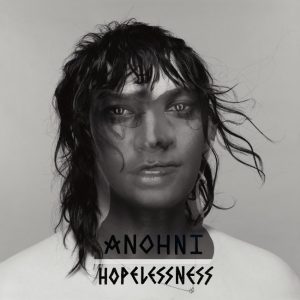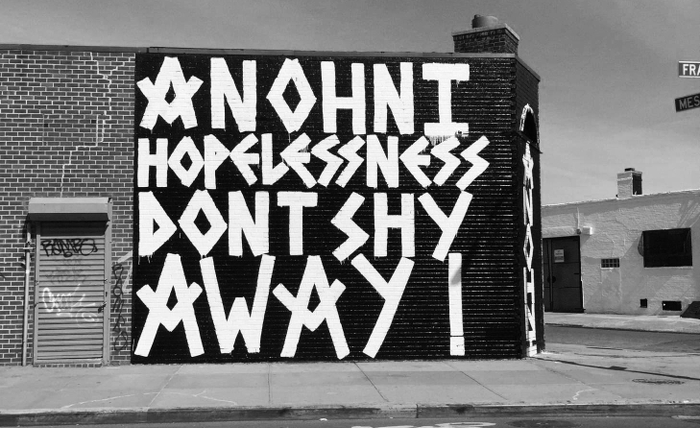The opening track, “Drone Bomb Me”—a jarringly catchy song, which Anohni writes from the perspective of a young Afghani girl whose family has been killed by a drone strike—warns listeners that what is to come on HOPELESSNESS will be emotionally heavy. The songs that follow explore topics as seemingly disparate as global warming and climate change (“4 Degrees”), surveillance in the name of safety (“Watch Me”), the theater of war and violence (“Crisis”), and (in multiple songs) the “I’ve got mine, so screw everyone else” attitude that has overtaken the North American consciousness in recent decades.
The music itself has a harder edge than that of Anohni’s past work, both with the Johnsons and with collaborators such as Bjork and Rufus Wainwright; compared to Anohni’s previous albums—filled with chamber-pop flourishes and string quartets—much of the instrumentation sounds downright chilly. Thanks to the production expertise of Hudson Mohawke and Oneohtrix Point Never, the music sounds distant, dark, and eerily spaced-out.
 HOPELESSNESS is filled with mournful electronic blips, cascading boop-heavy scales, and shuffling drum machine stops and starts that owe less to current musical trends and more to an imagining of what music might sound like a decade from now; to use a Star Wars comparison, the musical accompaniment is more akin to the chirps and clicks of a sad, introspective BB-8 rather than the cheerful frittering about of C-3PO.
HOPELESSNESS is filled with mournful electronic blips, cascading boop-heavy scales, and shuffling drum machine stops and starts that owe less to current musical trends and more to an imagining of what music might sound like a decade from now; to use a Star Wars comparison, the musical accompaniment is more akin to the chirps and clicks of a sad, introspective BB-8 rather than the cheerful frittering about of C-3PO.
The album’s standout track is “Obama,” a choral litany that manages to combine drone, electronica, and the pervading sense of disappointment that many people have felt with the current U.S. President’s domestic and foreign policy choices into a stern, evocative musical rebuke. Anohni’s voice sounds more robot-like here than it ever has, and one suspects that her choice to use her incredibly expressive lower register throughout is not accidental, especially given the lyrics:
When you were elected
The world cried for joy
We thought we had empowered
The truth telling envoy
As the rest of the song elucidates, Obama was not the “truth-telling envoy” that many people thought he was; in many ways, his policies are uncomfortably similar to those of past Presidents. The song’s final moments are its most powerful, as Anohni paints a grim portrait of a populace and its President’s belief in hope and change worn down by reality: “All the hope drained from your face / Like children we believed.” It’s not so much cynicism being expressed in this song, as it is deep sadness over the lack of change that this President has made—and that U.S. citizens were naïve enough to believe that he could make sweeping changes to a system (and a country) that seems so broken.
In 2012, Antony and the Johnsons included a spoken word piece, “Future Feminism,” on their live album Cut the World. As far as feminist theory goes, it’s interesting, if a little simplistic—Anohni’s connection of the moon cycles and feminism in particular recalls the unfortunate specter of 1970’s-era goddess feminism. While many of the threads in “Future Feminism” are echoed in HOPELESSNESS—the destruction of the environment and human connections to the natural world, powerful people working within systems that resist change, masculinity and violence—it’s clear that Anohni has been thinking through these ideas in all of their complexity, and is not afraid to examine issues from which many musicians would shy away. HOPELESSNESS is more proof that she is one of our most original voices.
Photos: Anohni

